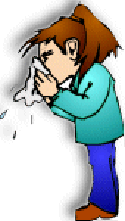-
 What Are Allergies?
What Are Allergies?
Allergies are an overreaction of the immune system to substances that usually cause no reaction in most individuals. They can trigger sneezing, wheezing, coughing and itching. They may be linked to common and serious chronic respiratory illnesses such as sinusitis and asthma.Allergic reactions range from mild to severe and even fatal reactions.The most common allergic diseases are:• Hayfever (Allergic Rhinitis). Characterized by nasal stuffiness, sneezing, nasal itching clear nasal discharge, and itching of the roof of the mouth and/or ears.• Allergic Asthma : Characterized by airway obstruction that is at least partially reversible with medication and is always associated with allergy. Symptoms include coughing, wheezing, shortness of breath or rapid breathing, chest tightness, and occasional fatigue and slight chest pain.•Allergic Conjunctivitis: Inflammation of the eyes, itchy, watery eyes and lid distress.• Hives (Urticaria) A reaction of the skin characterized by itchy, raised white bumps surrounded by an area of red inflammation.• Eczema (Atopic Dermatitis): A chronic or recurrent inflammatory skin disease characterized by lesions, scaling and flaking.• Contact Dermatitis: Characterized by skin inflammation.• Sinusitis: An inflammation of the sinuses which frequently mimics the common cold but the symptoms persist for a longer period of time. Fever may develop or persist. Symptoms include frontal head discomfort, facial pain that often worsen when bending or straining, and yellow or green nasal discharge.Interventions: There are a various ways of controlling allergies which help to reduce or eliminate symptoms:
• Avoiding the offending allergen(s).
• Taking medications, either prescribed or over-the-counter.
• Being immunized against the allergens with allergy injection therapy (desensitization). With proper management and education, allergic diseases can be controlled, and people with allergies can lead normal and productive lives.
Anaphylaxis is a medical emergency and the most severe form of an allergic reaction characterized by life-threatening symptoms.-
Symptoms include a generalized warmth or flush; tingling of palms, soles of feet or lips; lightheadedness; chest pain or tightness. This can progress into seizures, cardiac arrhythmia, shock and respiratory distress. Possible causes can be food, latex, medications, vaccines, and insect stings and bites.
Important Reminder
Please Be Sure To Supply Your School Nurse With Current Emergency Medication(i.e. EPI-PEN and/or BENADRYL) if your child has a history of severe allergy(s) (i.e. beestings, food, or latex)medication forms can be downloaded at the handouts for parents linkThe following sites can provide you with up-to date information on what you can do at home and in the school environment if your child has mild to severe allergies.
Internet Links
Allergy information and Epi-pen Video for consumers and teachers.
http://www.anaphylaxis.com/index.cfm
The American Latex Allergy Association
-

